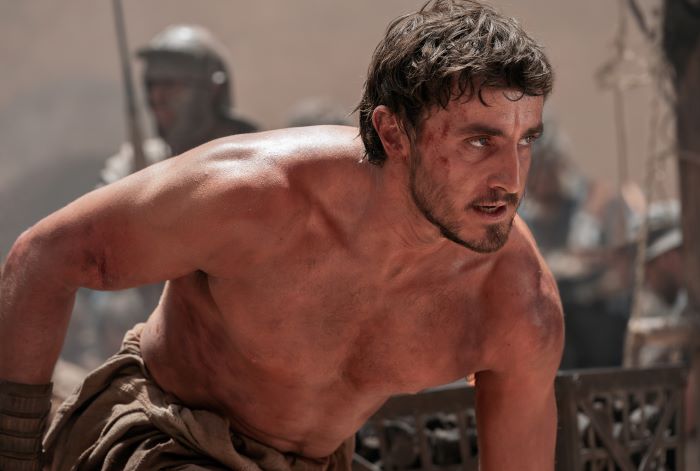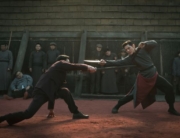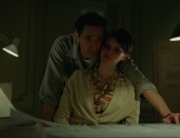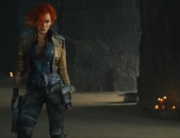The two big questions swirling around Gladiator II pre-release were always: 1. Was it necessary? and 2. Does it at least match the excitement and spectacle its predecessor generated? The answers are “Not really” and “Just enough, but not as much as it could have.”
It was always going to be difficult for Ridley Scott to top his 2000 Roman historical epic, which won widespread acclaim, took home the Best Picture Oscar, and entered several iconic quotes into the pop culture lexicon. But Gladiator was also a very self-contained story about Maximus Decimus Meridius’s revenge quest, and its tragic but satisfying ending didn’t leave many doors open for a sequel. Nonetheless, Scott tried for over two decades to make that continuation happen, and the result certainly reminds us that, when it comes to set pieces and sword-and-sandal action, Ridley Scott knows his stuff. But Gladiator II still feels like a more conventional Hollywood film, far too predictable in how it chooses to entertain the audience.
With Maximus very much dead, Gladiator II shifts its focus to Lucius Verus, the son of Lucilla (a returning Connie Nielsen) who, for his own protection, was smuggled out of Rome shortly after the events of the first movie. Now 15 years older and played by Paul Mescal, Lucius has carved out a life for himself as a farmer, husband, and soldier in North Africa, defending his new home from attacks by the ever-insatiable Roman Empire. It’s during these sieges that he loses his wife in battle to forces led by General Marcus Acacius (Pedro Pascal), and, much like Maximus before him, he is enslaved. It’s Lucius’s ferocity and refusal to bow to authority that catches the eye of Macrinus (the always-reliable Denzel Washington), an ex-slave-turned-gladiator-purchaser and arms dealer who sees in this fighter a chance to advance his goals within the empire’s corrupt leadership.
That very decay from within drives all of Gladiator II’s characters. Rome spreads its borders and body count under the maniacal rule of brotherly co-emperors Geta (Joseph Quinn) and Caracalla (Fred Hechinger), both caked in face powder and eccentric personalities clearly seeking to recreate the success of Joaquin Phoenix’s malevolently sniveling Commodus. Both want nothing more than to keep the expansion going, much to Acacius’s irritation at how many Romans must die to satisfy their egos. Therefore, Acacius, now married to Lucilla, seeks to overthrow the brothers, while Macrinus hobnobs with other Roman senators to win a seat in Geta and Caracalla’s inner circle. As for Lucius, all he cares about at first is getting revenge on Acacius. But eventually, he’ll need to confront his past and, regardless of whether he sought it out, become a leader capable of realizing his dream of a better Rome.
This is a more straightforward hero’s journey caught in a sprawling web of agendas and schemes compared to Gladiator, for good or ill. Mescal is decent as Lucius, but he’s no Russell Crowe. One can’t help but notice that Lucius’s goals shift where the plot needs them to, rather than because of any genuine revolutionary drive. Regarding his supporting cast, not everyone’s screen time is even. Like Nielsen, Derek Jacobi makes a return as Senator Gracchus but has very little to do, while even the heavy hitters like Pascal, Quinn, and Hechinger, despite giving solid performances, feel like they’re trying too hard to imitate some of the original film’s characters. The standout by far is Washington, who excels at keeping viewers guessing about Macrinus as his charisma and manipulations go hand-in-hand as both tools for power and ways to mask the pain of his past. It’s a scenery-chewing role, but one you can’t look away from and a testament to Washington’s status as one of the best actors working today.
If there’s one area where Gladiator II pulls no punches, it’s the set pieces where Scott shifts his gaze from political duplicity to epic, if not deeply silly, Roman combat. The dialogue might not be on par with Gladiator, but his action scenes shine in their versatility—not just hand-to-hand and sword combat, but Lucius fighting off a gladiator on a rhino and an all-out naval siege re-creation with ships inside the Coliseum. There are many elaborate, hard-hitting stunts, though the animal CGI is VERY evident at times. The movie also has its share of humorous moments, particularly one involving a monkey that highlights the crumbling state of Rome’s governing body, in a manner American audiences are likely feeling right now.
These fights and performances land Gladiator II on the more positive end of Scott’s mid-tier filmography: fun to watch, but never quite displaying the heart that made Gladiator, Alien, and Blade Runner classics. You won’t regret your time back in Rome, but you might still question whether we needed Gladiator II in this life or the next.







Leave A Comment